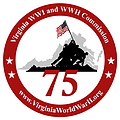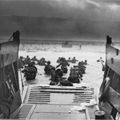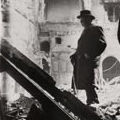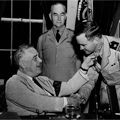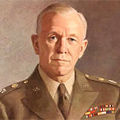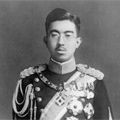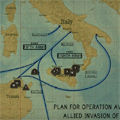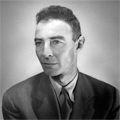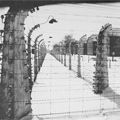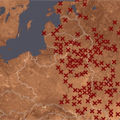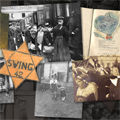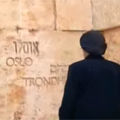Online module examining the causes and consequences of the global depression, with suggested discussion topics and classroom activities.
Lesson on the rise of Nazism in the aftermath of WWI.
Students analyze editorial cartoons following Hitler's rise in Europe and examine the early progression of WWII in Europe.
Examining the justifications that led the U.S. and Britain into WWII.
Students use primary and secondary sources to prepare a brief for General Eisenhower, advising him on how to proceed in planning the D-Day invasion. (See also Eisenhower and the Troops and Art of Deception: Selling a Story to the German Army)
Students read Hitler's radio address to examine how the Nazis came to power.
Four lessons detailing the progression of the war up to its end in Europe and in the Pacific.
Students examine the Battle of the Bulge through primary and secondary source readings.
Students match photographs with captions and dates to create a timeline of significant events in WWII.
Perspectives on the creation and use of the atomic bomb.
Students examine the dropping of the atomic bomb from four different perspectives.
Lesson plan focusing on the role of Justice Robert H. Jackson in the 1945 Nuremberg trials, and the effects of the trials leading up to the 1998 establishment of the International Criminal Court.
Lessons detailing the formation of the Allied Powers and their plans to rebuild Germany and Japan after the war.
Aligned to Virginia's Standards of Learning for History and Social Science

Lesson Plans
Resources
10th
Grade
SOL WHII.11a: The student will apply social science skills to understand World War II and its worldwide impact by explaining the major causes of the war
SOL WHII.11b: The student will apply social science skills to understand World War II and its worldwide impact by describing the leaders of the war, with emphasis on Franklin D. Roosevelt, Harry Truman, Dwight D. Eisenhower, Douglas MacArthur, George C. Marshall, Winston Churchill, Joseph Stalin, Adolf Hitler, Hideki Tojo, and Hirohito
SOL WHII.11c: The student will apply social science skills to understand World War II and its worldwide impact by describing the major events, including major battles and the role of new technologies
SOL WHII.11d: The student will apply social science skills to understand World War II and its worldwide impact by examining the Holocaust and other examples of genocide in the twentieth century
Date Which Will Live in Infamy
Interactive article on the attack on Pearl Harbor. See also Remembering Pearl Harbor (interactive map).
Short videos on D-Day, with emphasis on Eisenhower's role. See also Eisenhower Interactive Timeline.
Churchill and the Great Republic
Interactive exhibition emphasizing Churchill’s lifelong ties to the United States and his leadership in the WWII.
Biography, timeline, photographs, and other resources relating to the life of George C. Marshall.
The Naples-Foggia Campaign, Anzio and Rome-Arno Campaigns, Battle of the Atlantic, Normandy Campaign
American Battle Monuments Commission
Interactive maps and timelines of major campaigns in WWII.
Voices of the Manhattan Project
Biography, timeline, photographs, and other resources relating to the life of George C. Marshall.
United States Holocaust Memorial Museum
Searchable encyclopedia of topics related to the Holocaust. See also Guidelines for Teaching about the Holocaust.
Videos, readings, and documents relating to the Marshall Plan.
Hitler Speaking to Mass Crowds
Newsreel footage from 1930-1939 of Hitler addressing large audiences.
Responsibility of individuals, organizations, and governments during the Holocaust and other genocides.
Lesson examining the early signs of genocide.
Examining personal and collective responsibility in the Holocaust.
Holocaust History Animated Maps
United States Holocaust Memorial Museum
Animated maps detailing the scope and impact of the Holocaust.
Some Were Neighbors: Collaboration & Complicity in the Holocaust
United States Holocaust Memorial Museum
Online exhibition examining citizens' roles in allowing the Holocaust to happen.
SOL WHII.11e: The student will apply social science skills to understand World War II and its worldwide impact by examining the effects of the war, with emphasis on the terms of the peace, the war crime trials, the division of Europe, plans to rebuild Germany and Japan, and the creation of international cooperative organizations and the Universal Declaration of Human Rights (1948).

